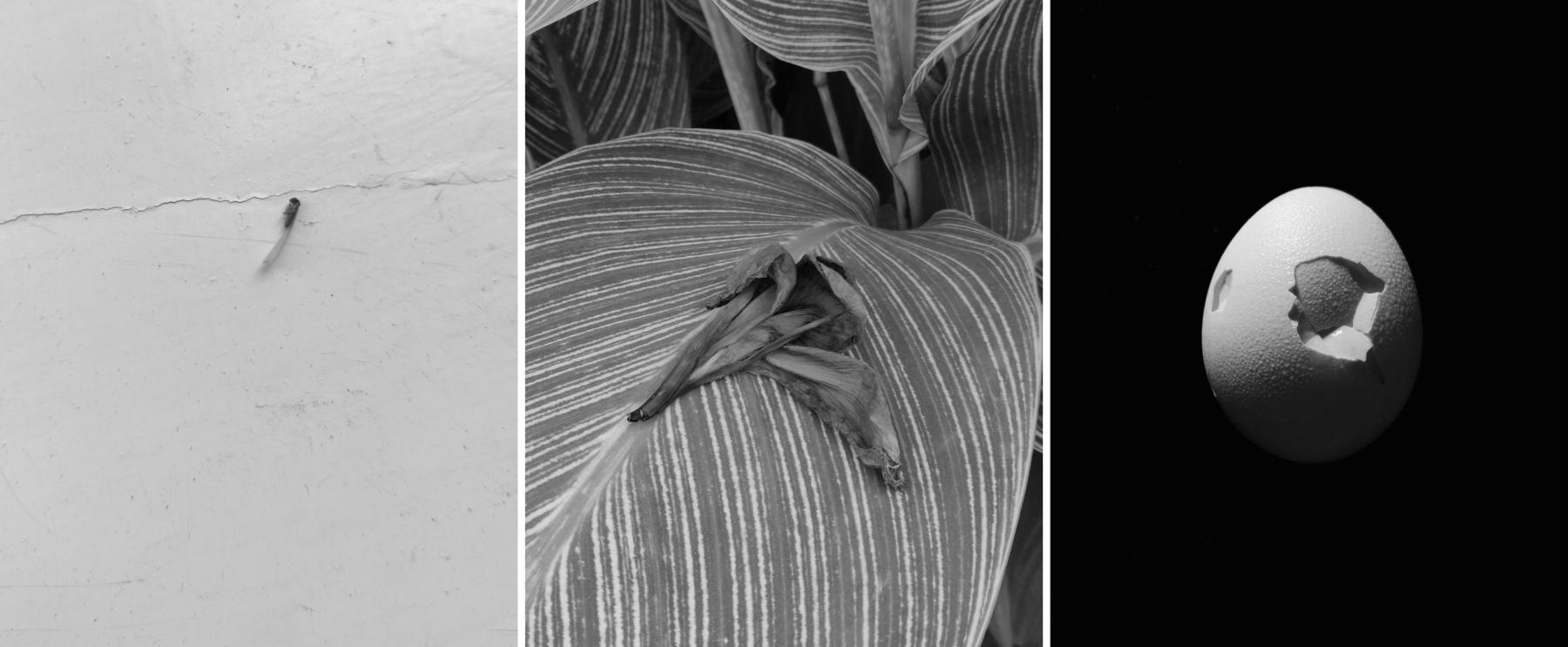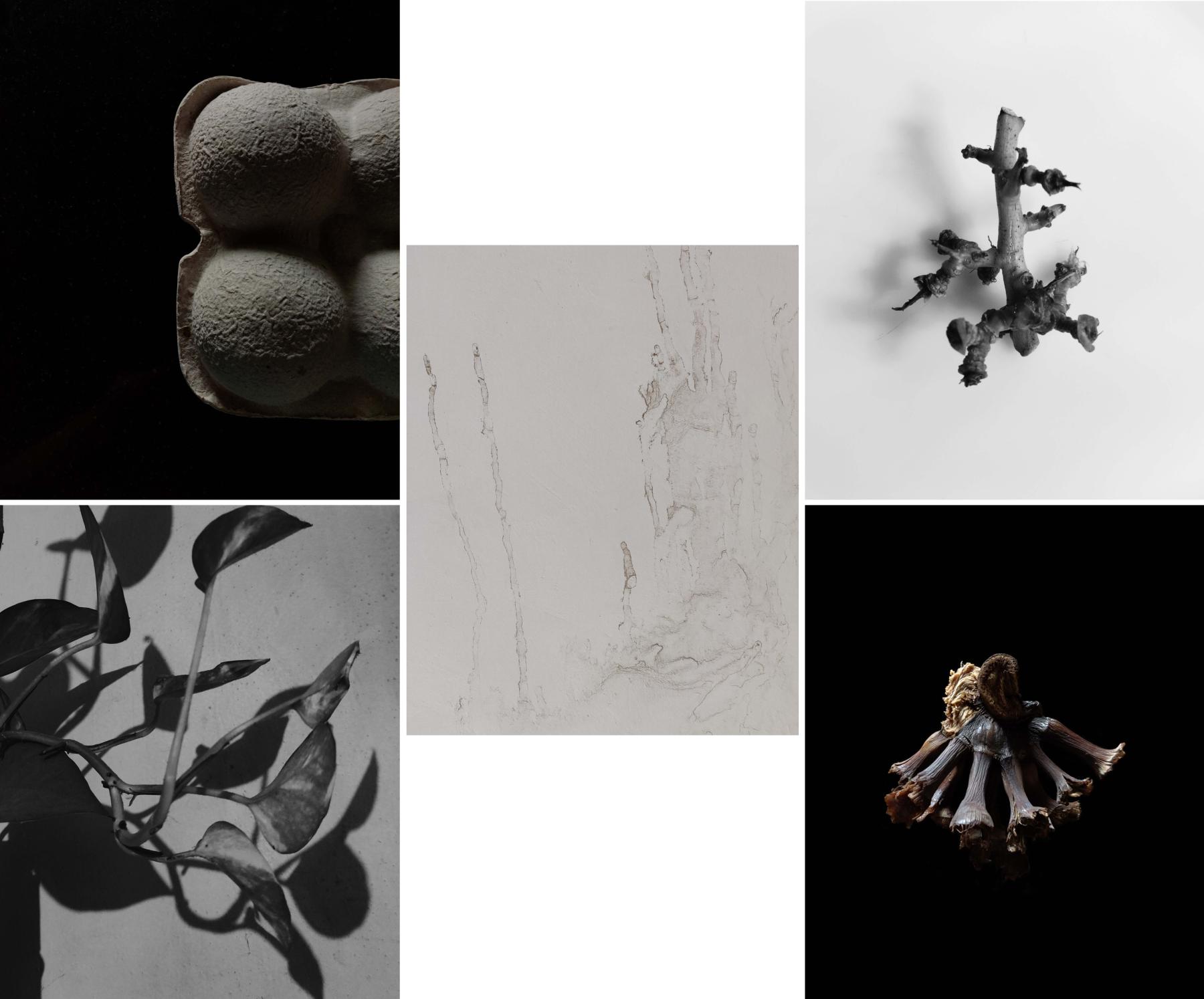Three Poems

From L to R: Isaac at the Dressing Table; There is No Road Through the Woods and Sleeping Serpents. All images by the author.
Wretched Woman
Wretched is the woe of the woman
That sears her heart and hardens all else.
Medusa, raped, was cursed to a gorgon;
Wretched is the woe of the woman.
Was it Eve, alone, who sinned in Eden?
Does the snow upon Sipylus still melt?
Wretched is the woe of the woman
That sears her heart and hardens all else.
Draupadi, disrobed, was pared to a guerdon;
Wretched is the woe of the woman.
Where Zeus revelled in his carnal passions,
Helen, herself, was pawned; her flesh, medalled.
Wretched is the woe of the woman
That sears her heart and hardens all else.
May Sita rather be burnt than wanton?
Wretched is the woe of the woman
For whom there is no hell worse than heaven,
To whom the gods were no different from the devil.
Wretched is the woe of the woman
That sears her heart and hardens all else.

From L to R: The Delicate Dead; The Slow Shrivel and On the Subject of Pedigree. All images by the author.
The Sin of Catamenia
A great throbbing began on a sinful eve,
In her lower orifices, and rose to her womb,
Her entrails, her breasts, her spine: a curse,
Like a window to a vineyard in Fars, rests under
Her navel, where grapes, from peduncles, hang
And discharge crimson in threads, like streams
Down the flared hood of a serpent, streaming,
Like sap from the mouth, the tongue, of Eve,
Rising from a swollen ovary, red as the hanging
Pistil of a hibiscus that conceals a seeded womb:
A mauve plumage of lust and temptation, under
Which, a hermaphrodite, a lingam, a procreant curse
Tears itself in birthing Man, impure, and accursed
Beyond redemption, a fish in sanguinary streams,
Wherein flows mirror-like water, passing fields, under
Rice, scythed, milled, by warm hands on midmonth’s eve,
Frothing with a fertility wasted in still virginal wombs,
Chastised by men of wood and valour, who hang
Corded, red-lotussed, like a skein of flesh hung
From a single yarn, emerging, as if through an ovine curse,
Through violence, bloody, pulsating, by virtue of similar wombs;
Man forgets his cradle, the seamed skin that streamed, streams,
For him and his, yet knots woman to it, as if an ewe
Reared to lamb, suckle, and nurse; as if a shrub under
Flowers; as if a flower, flamboyant genitalia, in the under-
Brush of a tree bent with fruits, luscious gonads, that hang
In servitude; as if a fish, a snake, cold-blooded; as if Eve,
Made of man’s rib, consigned to his side, a receptacle of curses;
A man must remember Man belongs to a woman as a stream
Knows all streams belong to their alpine wombs;
Many streams may flow, but the earth remains a womb,
Abundant and secular: all her banks, imposed; all borders under
Her land, Man-made; all her horizons, imagined; her streams
Flow to the moon, as blood to the womb, behind an overhang
Of serrate leaves, the catkins, and whisper Hecate’s curses
Cast upon all who scorn blood, scorn woman, scorn Eve.
The womb rests not beneath our feet but hangs
Over our destiny. Under our breath, our curses
Are our own: ruin streamed from Adam, not Eve.

From L to R: A Carton from Khajuraho; Tracing Streams; Fruitless Living; The Lip-leaved Devil’s Ivy; Birth of a Rot. All images by the author.
Hierophany
I. The Crucible of Life
Where does one find grace and stillness on this earth?
Not in the light that hones all things, not in whiteness at all,
Where all objects and all creatures are set against a whetstone.
The sun is a mother by virtue of her bestiality; to live in her light
Is to hone oneself, though to hone is to erode. I erode every day.
The edge of my body draws nearer to my core. I am reduced
To an animal. You are asleep. The night ingests your eyes.
Shadows recede at their longest. A wave breaks at its crest.
I am temporal and limited by temporal truths: nothing stands still.
There is no grace or mercy. A star flares in the distance, a little dot
Turns red, then white, then sienna, before it disappears into the west.
We will all burn red, and white, and sienna, before we disappear.
II. A Corporeal Liturgy
The earth laments none. All creatures turn into other creatures:
Maggots procreate in our orifices, mushrooms emerge from our
Abdomen, moths feed on our hair. Our flesh is no more than loam.
There is nothing transcendental about us. We are fed and we feed.
What nourishes our blood is nourished by it. Everything is verdure.
I look at your sleeping face, I see the glistening body of a dead fish.
The bird on our sill does not see it, and it does not see you either.
Animals are primal beings. They feed and they are fed: pedigree
Does not matter to them. All life unfolds from an anus. All that lives,
Lives vilely. All is transient. My carnal heart knows so, though it
Refuses to abide the heat in your limbs, your chest, your urine,
Your semen, you will never be dead. You need not be changed.
III. Heirloom of the Terrestrial
You are of this earth, but this earth will not come of you,
Though it will take you as it takes all else. Not even the orphans
Are heirless. I will find you in the bend of the highest bough of a tree,
In the madrigal of a stream as it flows over rocks, into the vulva
Of a lake, in a pistil rising from a red hibiscus like a phallus,
In the underside of a bird’s beak before it melds into
A feathered breast, in a nape adjoined to an unfamiliar
Head, and if I do not find you there, I will look for
The sea, mother of every child, music of the night,
A bosom for the weary, a pair of hips for the young.
I will find you by her shores,
In grace, in stillness.
All images courtesy the artist.
Alolika Dutta is a poet based in Bombay, India. Her work has appeared in The Penguin Book of Indian Poets, The Helter Skelter Anthology of New Writing, The Boston Globe, Indian Cultural Forum, among others. Apart from writing, Alolika paints, and photographs, too. Her paintings have been published in Aainanagar, and were displayed at the Hum Sab Sahmat: Reclaiming the Nation for its Citizens exhibition organised by SAHMAT in New Delhi. Her photographs hang on the walls of Seagull Books, Kolkata.




